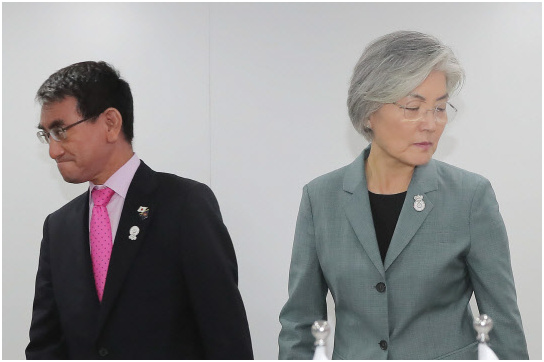Japan Expected to Remove Korea from Trade 'Whitelist'

South Korean Foreign Minister Kang Kyung-hwa had talks with Japanese Foreign Minister Taro Kono for 55 minutes in Bangkok on Aug. 1, but failed to reach any conclusion on resolving the escalating trade dispute between the two countries.
As a result, Japan is highly likely to exclude Korea from its whitelist this week, possibly on Aug. 2. If Japan removes Korea from the list of the countries that enjoy preferential treatment in trade, President Moon Jae-in is expected to put out a statement on the issue.
"I have no other positions," a Cheong Wa Dae official told reporters when asked about the outcome of the Korea-Japan foreign ministerial meeting in a news conference at the Korean presidential office. It meant that Korea failed to obtain Japan’s concessions.
The official said, "(Japan's whitelist exclusion) has not happened yet. We are drawing up measures in preparation for Korea’s exclusion from the whitelist."
Earlier on the day, Korean Foreign Minister Kang Kyung-hwa strongly requested that the Japanese government suspend or scrap its plan to erase Korea off from its whitelist at a meeting with her Japanese counterpart Taro Kono. However, the two sides only confirmed differences between their positions.
Some Korean officials hoped that the two sides would agree to accept the “standstill agreement” proposed by the United States, but that did not happen. Washington proposed that Japan put off the exclusion of Korea from the list while Korea suspend sales of Japanese corporate assets in Korea.
As a result, the Korean government has started reviewing all options including not renewing the Korea-Japan General Security of Military Information Agreement (GSOMIA) and the president putting out a special statement.
But Cheong Wa Dae took a prudent position. "There are various possibilities. It is risky to say definitively that Japan will exclude Korea from its whitelist," a Cheong Wa Dae official said.
Korean Foreign Minister Kang also said in a meeting with reporters, "We have made it clear that diplomatic authorities of both countries need to continue to talk anyway and that it will take time for both sides to solve the problem through dialogue,"
Even though Japan did not say specifically that it would exclude Korea from the whitelist during the ministerial meeting, the Korean government believes that the Japanese cabinet is highly likely to pass an amendment to the Export and Trade Control Order to scratch off Korea from the whitelist on Aug. 2.
During the meeting, both sides had a discussion on GSOMIA. When Japan excludes Korea from the whitelist, the Korean government is expected to decide not to renew the military information exchange agreement with Japan.
"If a decision is made by Japan tomorrow, we will have to take necessary countermeasures," Kang said. "Japan asserts that its export regulations have been taken for security reasons. Thus, we also have to examine various security frameworks." This means that if Japan decides to exclude Korea from the whitelist on Aug. 2, Korea may consider suspending GSOMIA.
The Korean and Japanese foreign ministers met each other for the first time since the Japanese government toughened its regulations on exports to Korea on July 4 in protest of a ruling by the Korean Supreme Court in favor of compensations for victims of Japan’s forced labor in the past.


